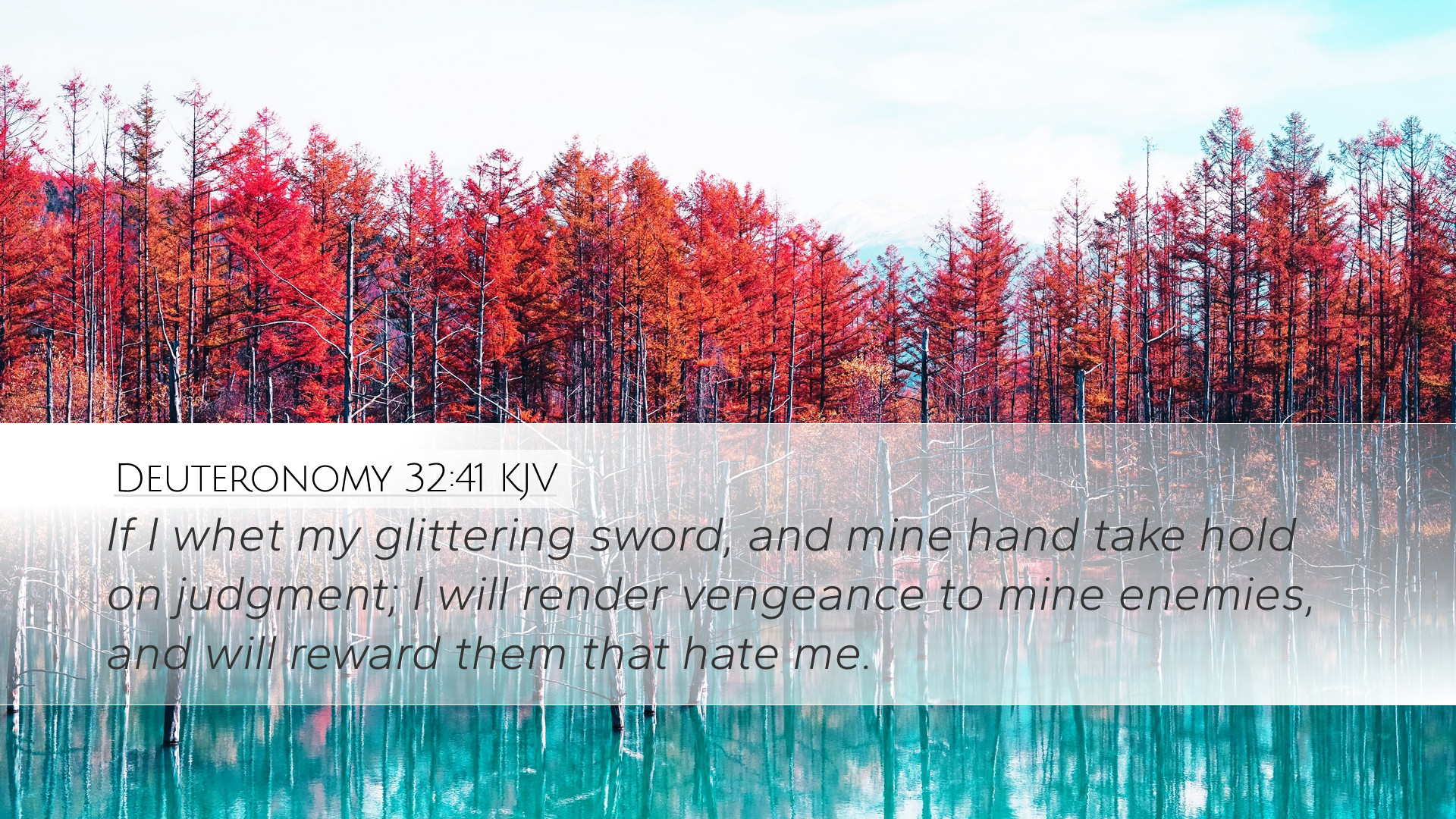Commentary on Deuteronomy 32:41
Bible Verse: "If I whet my glittering sword, and mine hand take hold on judgment; I will render vengeance to mine enemies, and will reward them that hate me."
Introduction
The verse we are examining, Deuteronomy 32:41, emerges from Moses' song, a poetic reflection on God's justice and the consequences of disobedience. This commentary will explore various insights garnered from revered public domain commentaries by Matthew Henry, Albert Barnes, and Adam Clarke, offering a comprehensive understanding for pastors, students, theologians, and Bible scholars.
Contextual Overview
Deuteronomy, being one of the significant books of the Pentateuch, serves as a recap of God's covenant with Israel before their entry into the Promised Land. In Chapter 32, Moses articulates both the faithfulness of God and the impending betrayals of His people. The verse is embedded within a broader message of divine justice, underscoring God's role as both protector and avenger.
Exegesis of Key Terms
- whet my glittering sword: This metaphorical expression implies preparation for action, suggesting readiness for judgment and warfare against the enemies of God and His people. It underscores the sharpness and effectiveness of God's judgment.
- mine hand take hold on judgment: This clause signifies God's authority and control. His hand embodies power to execute justice, asserting that God is not passive in the face of wickedness.
- render vengeance: The concept of vengeance in this context is not arbitrary but rather a consequence of rebellious actions against God's commandments. It indicates a righteous response to sin and opposition.
- reward them that hate me: God's justice encompasses the rewarding of wickedness. This line communicates that those who oppose God will ultimately face the repercussions of their actions.
Commentary Insights
Matthew Henry's Perspective: Henry emphasizes that the glittering sword represents God's unyielding justice. He notes that God's vengeance is profound and redemptive rather than merely punitive. Furthermore, he points out that God's judgment serves as a reminder of His holiness and the seriousness of sin. Henry’s perspective calls believers to self-examination in light of God's righteousness.
Albert Barnes' Commentary: Barnes articulates the notion of God's sword being sharp and ready, illustrating the immediacy of divine justice. He brings forth a theological framework that states God’s vengeance is balanced with mercy, yet those who are persistent in their defiance should not underestimate impending consequences. Barnes encourages readers to see judgment as a deterrent against rebellion, stressing that one's relationship with God will influence their destiny.
Adam Clarke’s Insights: Clarke delves deeper into the implications of Divine vengeance, likening it to the inevitable natural laws that govern existence. He asserts that hatred for God translates into a choice that engenders spiritual decay. Clarke’s reflections compel readers to consider their own enmity towards God's will, propelling a discussion on grace amid judgment, suggesting that despite God's fierce sword, His willingness to forgive remains a constant theme in His interactions with humankind.
Theological Implications
This verse invites a pressing inquiry into the nature of God's justice. It beckons scholars and theologians to explore the balance between God's love and His call for righteousness. The duality of God's character as both merciful and just becomes a focal point of discussion.
Practical Applications
For pastors and spiritual leaders, this verse serves as a cautionary reminder of the seriousness of sin and the urgency of repentance. It highlights the importance of preaching on judgment while equally emphasizing God’s redemptive love. In pastoral counseling, this verse can provide a framework to address issues of disobedience, encouraging believers to trust in God's goodness, even in the face of judgment.
Conclusion
Deuteronomy 32:41 encapsulates a profound truth regarding God's holy nature, His readiness to judge, and the implications of human rebellion. Integrating insights from esteemed biblical scholars strengthens our understanding and appreciation of this verse. In preparing to share this message, whether through preaching, teaching, or personal study, engaging with the text through the lens of historical and theological commentaries allows for a richer, more nuanced approach to God's word.


